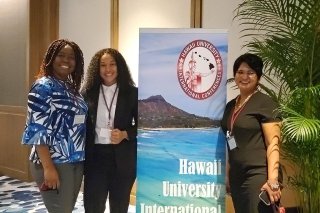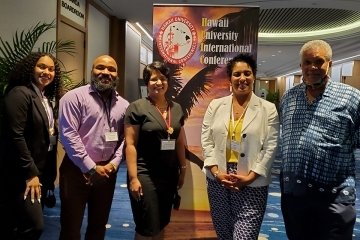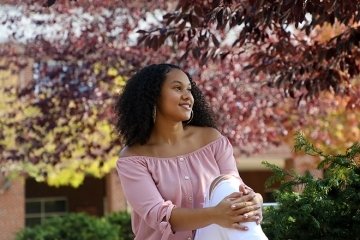Speech pathology career path takes shape with undergraduate research journey
Bloomsburg
Posted

It’s been a big year for Serenity Vidot’s research looking into how the speech-language pathology field can overcome its disparities in access to services for students of color.
Her collaborative work hit centerstage this spring at the virtual Pennsylvania State System of Higher Education’s Frederick Douglass Research Debate series and then reached the international stage this summer in Hawaii, where she was the youngest presenter among roughly 130 researchers representing more than 100 schools worldwide.
“I wanted to take advantage of this rare opportunity, because I knew it would add to my educational and professional growth here at Bloomsburg,” says Vidot, a junior audiology and speech-language pathology major. “Not only was I exposed to professors from many different fields, but I gained experience presenting my own work. It was an opportunity I couldn’t pass up!”
This past spring Bloomsburg's Frederick Douglass Institute for Academic Excellence in partnership with Act 101 launched its Research Initiative, identifying students from underrepresented groups with an interest in research to provide them with opportunities for training and mentorship in research.
"Serenity was the first beneficiary of this initiative and superseded all expectations," says Carolyn Reid-Brown, assistant professor of exceptionality programs and director of the Fredrick Douglass Institute. "She received one of the awards for Best Presentation at the PASSHE FDI conference and was lauded for bringing attention to the racial and cultural disparities in the field of speech pathology on this state-wide platform. She clearly articulated how her studies at BU would not only prepare her to effectively serve in this field, but also creates the platform for effecting change across communities of color."

In June, Vidot presented Speech-Language Pathology and People of Color: A Social Justice Perspective at the Arts, Humanities, Social Sciences, STEM/STEAM, and Education Conference at Hawaii University.
The research looks at how bridging the gap between racial, ethnic and linguistic minorities and speech services is imperative to building a better foundation for students in need of these services. Co-authors on the research are Ashwini Kanade, assistant professor of communication sciences and disorders, and Reid-Brown, as well as Shannon Musgrove, formally Bloomsburg’s assistant director of Act 101/EOP. The research was then published by Hawaii University following the conference, according to Vidot.
“This conference gave me the chance to create connections with professors from a variety of universities, fields, and backgrounds,” Vidot says. “This will aid me in my journey as I complete my undergraduate degree and head to graduate school.”
According to Vidot, she's more convinced than ever she's heading in the right direction with her career vision firmly focused on helping those who've been so regularly overlooked and underrepresented.
“Where I come from, speech-language pathology was not a common career to pursue, let alone an option as it required additional education that many of us were not properly prepared for or could not afford,” Vidot says. “While I had family and friends who struggled with speech and were not provided the proper services, I also had some job shadow experiences where I witnessed some children never being referred for services, or they received free speech services from the local school district, but they were very minimal and not much progress was made.”
Vidot says she knew of one speech therapist who was stretched out among 30 children from about three different schools.
“I began to ask myself why lack of referrals and proper services are an issue in such a major field,” Vidot says. “My unanswered questions were met by the opportunity to conduct my very own research with the help of Dr. Kanade, Dr. Reid-Brown and Ms. Musgrove. It lit a fire in me I never knew I had for research.”
Vidot says learning opportunities such as this research process not only has allowed her to build a network of scholars pursuing higher education and thriving in it but grew her confidence to continue research and present at more large-scale academic events.
“One important lesson I took from this was to never let pre-conceived notions hinder your willingness to learn and keep an open mind,” Vidot says. “It was during this conference when I learned the true meaning of research.”

And her work is not done.
"We've barely scratched the surface with our research, as COVID has delayed our progress," Vidot says. "Some research we found brings light to an issue that earlier findings state children of color are overrepresented in special education, but they're possibly underrepresented in speech services. We've been putting a lot of thought into the difference of language, cultural practices, and beliefs that may contribute to the lack of referrals and services for these communities of color."
Vidot says this research experience has already had a lasting impact on her.
"As a future speech therapist of color, I believe it's vital to know how the field I'm in interacts with the very community I'm part of," Vidot says. "I'm here to represent the underrepresented. This research is another tool I can use to encourage diversity, awareness, and change within my field. I'm ready to be an advocate for my community, while serving them as well."



